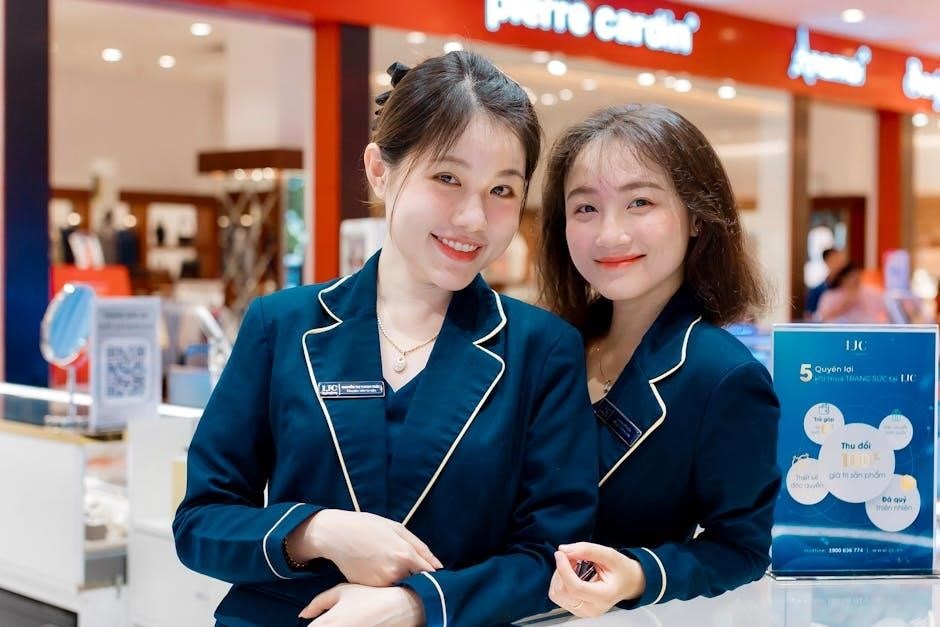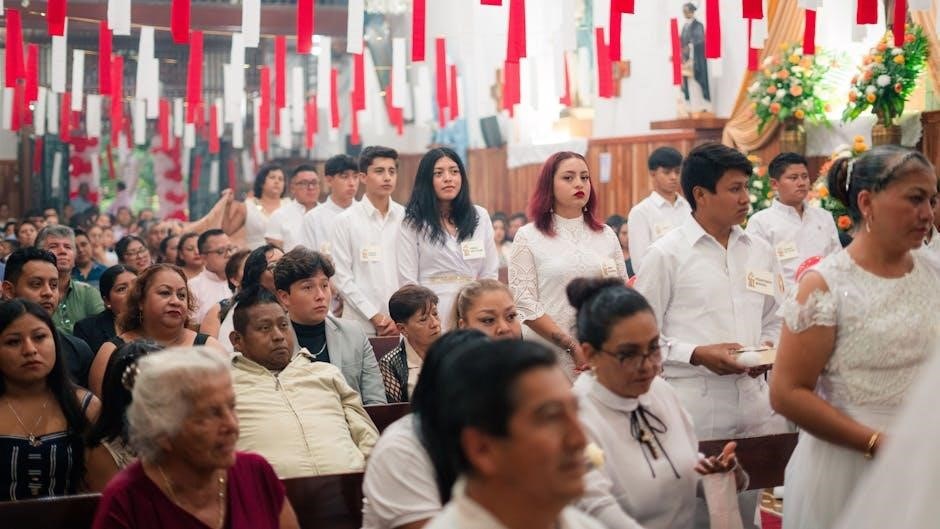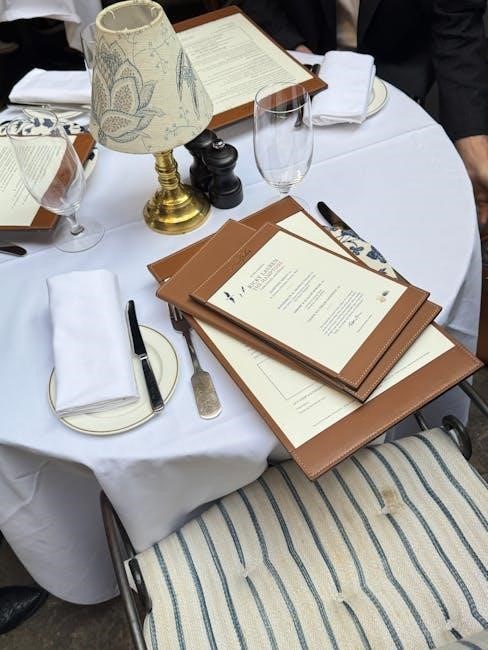RLK Guide Service is a trusted organization specializing in wild horse management. With 21 HMAs, two preparation facilities, and a training center, they ensure humane treatment and care. Their growing compliance team and extensive adopter network underscore their commitment to ethical practices and community engagement in wild horse conservation.
1.1 Overview of RLK Guide Service
RLK Guide Service is a leading organization in wild horse and burro management, operating with a strong commitment to ethical practices and conservation. With 21 Horse Management Areas (HMAs), two preparation facilities, and a dedicated training center, RLK ensures the humane treatment and care of wild horses. Their experienced team and growing compliance program work tirelessly to maintain ethical standards, fostering trust and engagement within local communities and adopters alike.
1.2 Importance of Guide Services in Outdoor Activities
Guide services are essential for ensuring safety, education, and conservation in outdoor activities. Trained professionals provide expertise in navigation, wildlife behavior, and environmental stewardship, enhancing the overall experience. For RLK Guide Service, these roles are critical in managing wild horse populations and educating participants. Their services foster a deeper understanding of nature while promoting ethical practices, balancing tourism with conservation efforts to protect ecosystems and wildlife for future generations.
History and Background of RLK Guide Service
Founded with a commitment to wild horse management, RLK Guide Service has grown to include 21 HMAs, two preparation facilities, a training center, and a dedicated compliance team.
2.1 Founding and Evolution of RLK Guide Service
RLK Guide Service was established to address the growing need for professional wild horse management. Initially focused on small-scale operations, the organization expanded its reach, developing 21 HMAs and two preparation facilities. Over time, RLK evolved to include a dedicated training center and a compliance team, ensuring ethical practices and community engagement in wild horse conservation efforts.
2.2 Key Milestones in the Development of RLK Guide Service
RLK Guide Service has achieved significant milestones, including the establishment of 21 Horse Management Areas (HMAs) and two preparation facilities. The development of a dedicated training center marked a pivotal moment in their evolution. Additionally, the expansion of their compliance team and adopter network highlighted their commitment to ethical practices and conservation. These milestones underscore RLK’s growth and dedication to responsible wild horse management.
Services Offered by RLK Guide Service
RLK Guide Service provides guided tours, educational programs, and customized itineraries, ensuring immersive outdoor experiences. Their services emphasize conservation, education, and ethical animal treatment, catering to diverse client needs.
3.1 Types of Guided Tours and Expeditions
RLK Guide Service offers diverse guided tours, including wild horse observation, adoption process insights, and training sessions. They provide immersive experiences, blending education with adventure, while utilizing technology like tracking tools to enhance tours. Experienced guides lead expeditions, ensuring safe and engaging journeys. The service emphasizes eco-friendly practices and responsible wildlife interaction, making it a unique choice for nature enthusiasts and those interested in wild horse conservation efforts.
3.2 Educational Programs and Workshops
RLK Guide Service offers comprehensive educational programs and workshops focused on wild horse behavior, adoption, and training. These sessions, led by experienced professionals, emphasize humane treatment and responsible wildlife interaction. Workshops often include hands-on training and seminars on conservation efforts. The service also partners with communities to promote awareness and stewardship of wild horses, ensuring a well-rounded educational experience for participants of all skill levels.
3.3 Customized Itineraries for Specialized Needs
RLK Guide Service provides tailored itineraries to meet unique client requirements, ensuring personalized experiences for researchers, photographers, and families. Their flexible approach allows for specialized focus areas, such as wild horse behavior or conservation efforts. With expertise in HMA management, RLK crafts tours that balance educational value and adventure, catering to diverse interests while maintaining a commitment to ethical wildlife interaction and sustainable practices.
Horse Management Areas (HMAs)
HMAs are designated regions for managing wild horses, with RLK overseeing 21 areas. These zones ensure balanced ecosystems and sustainable horse populations while promoting conservation efforts effectively.
4.1 Definition and Purpose of HMAs
Horse Management Areas (HMAs) are designated regions for overseeing wild horse populations. RLK Guide Service manages 21 HMAs, focusing on conservation, ecosystem balance, and ethical horse treatment. These areas ensure sustainable management practices, protecting both the horses and their habitats. HMAs play a critical role in maintaining healthy wild horse populations while addressing environmental and logistical challenges in wild horse conservation efforts.
4.2 Role of RLK Guide Service in HMA Management
RLK Guide Service plays a pivotal role in HMA management by overseeing 21 Horse Management Areas. They ensure humane treatment, sustainable practices, and compliance with legal standards. Their team manages preparation facilities and a training center, fostering a balanced ecosystem. By engaging with adopters and the community, RLK promotes ethical horse care and conservation, addressing environmental challenges while maintaining the integrity of wild horse populations and their habitats.
4.3 Challenges and Opportunities in HMA Administration
Managing 21 HMAs presents logistical challenges, including ensuring humane treatment and maintaining compliance with evolving regulations. Environmental factors like habitat preservation and resource allocation add complexity. However, these challenges also offer opportunities for RLK Guide Service to innovate. By fostering partnerships and engaging the community, RLK can enhance conservation efforts and adoption rates. Strategic collaborations and adoption programs further enable RLK to balance tourism with wildlife preservation, ensuring sustainable management of wild horse populations;

Adoption and Training Processes
RLK Guide Service offers structured adoption and training programs for wild horses, utilizing preparation facilities and a dedicated training center to ensure successful transitions for adopters and animals.
5.1 Overview of the Adoption Process for Wild Horses
The adoption process for wild horses through RLK Guide Service involves a structured approach to ensure humane treatment and successful transitions. Prospective adopters are guided through preparation and training programs, with support from a growing compliance team. The process emphasizes matching horses with suitable adopters, fostering trust and mutual understanding. This system ensures both the horses and adopters benefit from a well-organized and compassionate adoption journey.
5.2 Training Facilities and Programs
RLK Guide Service operates a specialized training facility, including a unique partnership with a local jail, to prepare wild horses for adoption. Experienced trainers use tailored methods to build trust and skills, ensuring horses are ready for new homes. The facility is equipped to handle diverse needs, focusing on humane practices and positive reinforcement. This approach fosters strong bonds between horses and handlers, enhancing adoptability and post-adoption success rates significantly.
5.3 Success Stories of Adopted Horses
RLK Guide Service proudly shares stories of wild horses thriving in new homes. Many adopted horses excel in trail riding, therapy, and competition, showcasing their adaptability. A notable success is a horse trained at the jail facility, now serving as a therapy animal. These stories highlight RLK’s dedication to rehabilitation and the strong bond between adopters and horses, inspiring others to consider adoption and support conservation efforts.

Partnerships and Collaborations
RLK Guide Service collaborates with organizations and communities to promote conservation and education. Strategic partnerships enhance their mission, fostering mutual goals and sustainable practices in wild horse management.
6.1 Strategic Partnerships with Other Organizations
RLK Guide Service collaborates with conservation groups, educational institutions, and community organizations to enhance its mission. These partnerships focus on expanding adoption programs, improving training methods, and promoting ethical wild horse management. By aligning with like-minded organizations, RLK ensures a unified approach to wild horse welfare, fostering innovation and shared resources to achieve long-term conservation goals.
6.2 Community Involvement and Outreach Programs
RLK Guide Service actively engages with local communities through outreach programs, fostering awareness and participation in wild horse conservation. Educational workshops, volunteer opportunities, and collaborative events with schools and conservation groups highlight their commitment to community involvement. These initiatives not only promote ethical horse management but also strengthen ties between residents and the organization, ensuring a collective effort in preserving wild horse populations and their habitats.
6.3 Collaborative Efforts in Wildlife Conservation
RLK Guide Service collaborates with wildlife conservation organizations to protect wild horse populations and their habitats. Through joint initiatives with local and national groups, they share resources, expertise, and research to enhance conservation outcomes. These partnerships also support sustainable land management and educate the public about the importance of preserving wild horses, fostering a unified approach to wildlife preservation and ecosystem balance.

Ethical Practices and Humane Treatment
RLK Guide Service prioritizes ethical practices and humane treatment of wild horses. Their training programs and compliance team ensure animals receive proper care, adhering to strict guidelines.
7.1 Commitment to Humane Treatment of Animals
RLK Guide Service is deeply committed to the humane treatment of animals, ensuring their well-being through ethical practices. With two preparation facilities and a training center, they provide proper care, handling, and rehabilitation for wild horses. Their team adheres to strict guidelines, fostering trust and respect for animal welfare. This dedication ensures that every horse receives the attention and compassion needed for a safe and healthy transition into adoption or conservation programs.
7.2 Ethical Guidelines for Guide Services
RLK Guide Service adheres to strict ethical guidelines, ensuring transparency, respect, and integrity in all operations. Guides are trained to prioritize animal welfare, environmental conservation, and client safety. The service promotes responsible wildlife interaction and sustainable practices, minimizing ecological impact. These guidelines foster trust and accountability, ensuring that every activity aligns with ethical standards and contributes positively to conservation efforts and community well-being.
7.3 Compliance with Legal and Ethical Standards
RLK Guide Service rigorously complies with legal and ethical standards, ensuring operations align with federal and state regulations. The service collaborates with agencies like the BLM to maintain adherence to wildlife management laws. A dedicated compliance team oversees all activities, guaranteeing transparency and accountability. Regular audits and training programs ensure that ethical standards are upheld, fostering trust and integrity in all aspects of their operations and conservation efforts.
Career Opportunities and Training
RLK Guide Service offers diverse career paths, including guides, trainers, and administrators. Comprehensive training programs, hands-on experience, and skill development ensure professionals excel in wild horse management and conservation efforts.
8.1 Career Paths in Guide Services
RLK Guide Service offers diverse career opportunities, including roles as wild horse handlers, tour guides, and conservation specialists. Professionals can advance in areas like animal behavior, environmental management, and community outreach. With a focus on ethical practices, careers at RLK Guide Service provide fulfilling experiences for those passionate about wildlife conservation and education, ensuring a direct impact on wild horse welfare and ecosystem preservation;
8.2 Training Requirements for Guides
Guides at RLK Guide Service undergo rigorous training to ensure expertise in wild horse behavior, first aid, and environmental regulations. They must complete certifications in animal handling and wilderness navigation. Continuous education is emphasized to stay updated on best practices. Practical experience and mentorship programs further enhance their skills, ensuring guides are well-prepared to lead safe and educational expeditions while promoting ethical conservation practices.
8.3 Professional Development Programs
RLK Guide Service offers comprehensive professional development programs to enhance guides’ skills and knowledge. These include workshops on wild horse behavior, conservation practices, and leadership. Guides also participate in mentorship programs and industry conferences to stay updated on best practices. Continuous learning opportunities ensure they remain proficient in handling challenging situations, fostering a culture of excellence and innovation within the organization.

Technology and Innovation in Guide Services
RLK Guide Service integrates advanced tools like AdGuard Home, Mailcow, and Onedev to streamline operations. Digital platforms enhance HMA management, adoption processes, and guide training, ensuring efficiency and innovation.
9.1 Use of Technology in Guided Tours
RLK Guide Service leverages technology to enhance guided tours, utilizing tools like GPS tracking and real-time data for efficient navigation. Digital platforms provide interactive educational content, ensuring engaging experiences. Apps like AdGuard Home and Paperless streamline tour logistics, while Plausible analytics optimize tour routes. These innovations improve safety, accessibility, and overall customer satisfaction, setting RLK apart in outdoor guide services.
9.2 Innovative Tools for HMA Management
RLK Guide Service employs cutting-edge tools like AdGuard Home and Paperless for streamlined HMA operations. Mailcow enhances communication, while Onedev supports infrastructure management. These technologies enable efficient monitoring of wild horse populations, ensuring sustainable practices. By integrating innovative software, RLK optimizes resource allocation and improves data accuracy, fostering effective conservation efforts in their 21 HMAs and associated facilities.
9.3 Digital Platforms for Service Delivery
RLK Guide Service leverages digital platforms to enhance service delivery, ensuring transparency and efficiency. Online portals provide real-time updates on HMA management, while mobile apps offer accessible tools for adopters and volunteers. Digital platforms also facilitate communication, training, and resource sharing, enabling RLK to streamline operations and improve stakeholder engagement. This integration of technology supports their mission to deliver high-quality, user-centric services in wild horse conservation and management.

Challenges Faced by RLK Guide Service
RLK Guide Service faces environmental challenges, balancing tourism with conservation, and adapting to changing regulations, requiring innovative solutions to maintain efficiency and ethical standards in wild horse management.
10.1 Environmental and Logistical Challenges
RLK Guide Service faces significant environmental challenges, including managing 21 HMAs across diverse terrains and adapting to harsh weather conditions. Logistical complexities arise from coordinating operations across vast areas, ensuring resource availability, and maintaining infrastructure. These challenges are compounded by the need to balance wild horse management with ecological preservation, requiring innovative solutions and strategic planning to sustain operations effectively while minimizing environmental impact.
10.2 Balancing Tourism and Conservation
RLK Guide Service navigates the challenge of balancing tourism growth with conservation efforts. As ecotourism gains popularity, managing visitor impacts on sensitive habitats becomes crucial. The organization implements sustainable practices to preserve wild horse ecosystems while offering educational tours. By promoting responsible tourism, RLK ensures the protection of natural resources and fosters a deeper appreciation for wildlife conservation among visitors.
10.3 Adapting to Changing Regulations
RLK Guide Service faces challenges in adapting to evolving laws and policies governing wild horse management. The organization works closely with regulatory agencies to ensure compliance with updated standards. By staying informed and proactive, RLK balances operational needs with legal requirements, maintaining its commitment to ethical practices and conservation. This adaptability ensures the organization remains effective in its mission while navigating a dynamic regulatory landscape.
Success Stories and Testimonials
RLK Guide Service has earned a reputation for its dedication to wild horse conservation. Clients praise its ethical practices, while adopters highlight the positive impact on local communities.
11.1 Client Testimonials and Feedback
Clients praise RLK Guide Service for its professionalism and dedication to wild horse conservation. Many highlight the seamless adoption process and the humane treatment of animals. Feedback often emphasizes the knowledgeable staff and their passion for educating adopters. Testimonials also commend the organization’s commitment to community engagement and its role in fostering a deeper connection between people and wild horses. Overall, clients express high satisfaction with the services provided.
11.2 Notable Achievements in Conservation
RLK Guide Service has made significant strides in wild horse conservation. Managing 21 HMAs, they have successfully rehomed numerous horses while maintaining ethical standards. Their collaborative efforts with partners have enhanced conservation practices, earning recognition in the field. By prioritizing humane treatment and community education, RLK has set a benchmark for effective wild horse management, ensuring a sustainable future for these animals and their habitats.
11.3 Impact on Local Communities
RLK Guide Service has positively influenced local communities by fostering education and awareness about wild horse conservation. Their outreach programs and collaborative efforts have created jobs and promoted environmental stewardship. By engaging residents in conservation activities, RLK has strengthened community ties and supported local economies, ensuring a lasting impact on both the people and the wild horses they protect.

Future of RLK Guide Service
RLK Guide Service aims to expand its conservation efforts and adopt more innovative technologies. By strengthening community partnerships and advancing ethical practices, RLK will continue to lead in humane wild horse management, ensuring a sustainable future for both the horses and the ecosystems they inhabit.
12.1 Vision and Mission for the Future
RLK Guide Service envisions a future where wild horse conservation and humane management thrive. Their mission is to expand innovative technologies, strengthen community partnerships, and advance ethical practices. By prioritizing sustainability and education, RLK aims to ensure the well-being of wild horses and burros while fostering a deeper connection between people and nature. Continuous improvement and strategic growth will guide their efforts to protect and preserve these magnificent animals for generations to come.
12.2 Expansion Plans and New Initiatives
RLK Guide Service plans to expand its operations by establishing new state-of-the-art training facilities and increasing its network of Horse Management Areas. They aim to invest in advanced technologies for better HMA monitoring and adopter engagement. New educational programs and workshops will be launched to promote wild horse conservation. Strategic partnerships with conservation organizations and local communities will further enhance their impact and ensure sustainable growth in the future.
12.3 Continuous Improvement Strategies
RLK Guide Service focuses on continuous improvement through ongoing staff training, technology integration, and community feedback. They regularly assess and refine their HMA management practices, ensuring alignment with ethical standards. By fostering innovation and transparency, RLK aims to enhance service delivery, strengthen adopter relationships, and maintain their commitment to humane wild horse care and conservation efforts.
RLK Guide Service exemplifies dedication to ethical wild horse management and conservation. Their commitment to humane care, community engagement, and sustainable practices ensures a lasting positive impact.
13.1 Summary of Key Points
RLK Guide Service is a dedicated organization managing wild horses across 21 HMAs, with facilities for preparation and training. Their commitment to ethical practices, humane care, and community engagement underscores their role in conservation. By fostering education and sustainable practices, RLK Guide Service ensures the well-being of wild horses and burros, promoting a balanced approach to tourism and environmental stewardship for future generations.
13.2 Final Thoughts on the Importance of RLK Guide Service
RLK Guide Service plays a vital role in wild horse conservation, education, and community engagement. With 21 HMAs and specialized facilities, they ensure humane care and sustainable management. Their dedication to ethical practices and collaboration fosters a balanced approach to tourism and environmental stewardship, making them a cornerstone in protecting wild horses and burros while educating future generations about their importance and conservation needs.
